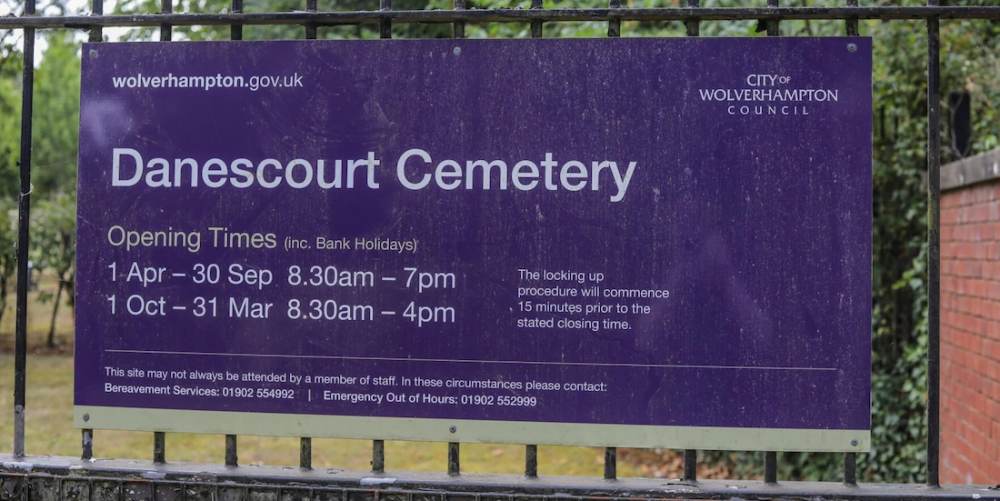
U.K. city authorities abandon discriminatory fees for larger burial spaces after public outcry
New York, N.Y. – The Wolverhampton City Council in England–a city the size of Jersey City or Orlando–has reversed its controversial policy of charging additional fees for larger burial plots, effectively ending what critics called a discriminatory “fat tax” on deceased individuals requiring oversized coffins.
The policy, which had been quietly implemented at Danescourt Cemetery, charged families an extra £406 ($515) for burial plots measuring more than 30 inches (76 cm) wide, targeting coffins designed for individuals weighing over 280 pounds (127 kg). The surcharge represented a 25% increase over standard burial fees, sparking widespread condemnation from disability rights advocates and anti-discrimination organizations.
Public Outcry Forces Policy Reversal
The controversial fee structure came to public attention when grieving families began sharing their experiences on social media, describing the additional financial burden during already difficult times. Sarah Thompson, whose father required a larger coffin due to medical complications from diabetes, called the policy “heartless and discriminatory.”
“We were already dealing with the loss of our loved one, and then the council hits us with this extra charge,” Thompson said. “It felt like they were punishing our family for something completely beyond our control.”
The U.K. Equality and Human Rights Commission quickly intervened, threatening legal action under the Equality Act 2010, which prohibits discrimination based on disability. The commission argued that charging extra fees for larger burial spaces constituted indirect discrimination against individuals whose size resulted from medical conditions.

Medical Community Raises Concerns
Dr. Michael Harrison, a consultant endocrinologist at Royal Wolverhampton NHS Trust, criticized the policy as medically ignorant. “Many conditions including Cushing’s syndrome, hypothyroidism, and certain medications can cause significant weight gain,” Harrison explained. “Penalizing families for these medical realities shows a fundamental misunderstanding of health conditions.”
The British Medical Association issued a statement supporting the policy reversal, noting that weight-related health issues often intersect with socioeconomic factors, making the additional fees particularly burdensome for vulnerable families.
Local funeral directors reported that the policy created uncomfortable situations when families discovered the additional charges, often during emotionally charged planning meetings. James Mitchell, director of Mitchell Family Funeral Services, described having to explain the surcharge as “one of the most difficult conversations” in his 30-year career.

Council Defends Then Abandons Policy
Initially, Wolverhampton City Council defended the policy as necessary to cover additional costs associated with larger burial plots, including specialized equipment and extended labor requirements. Council spokesperson Margaret Davies argued that the fees reflected “genuine operational challenges” rather than discriminatory intent.
However, mounting pressure from advocacy groups and negative media coverage forced council leaders to reconsider. The Campaign for Dignity in Death, a national advocacy organization, organized protests outside council offices, attracting support from disability rights activists nationwide.
Councillor Patricia Williams, who chairs the council’s Environmental Services Committee, announced the policy reversal during a heated public meeting. “After careful consideration and extensive consultation, we recognize that this policy was inappropriate and potentially discriminatory,” Williams stated.

Legal and Ethical Implications

The Wolverhampton case highlights broader issues surrounding death care accessibility and discrimination in public services. Legal experts suggest the controversy could establish important precedents for similar policies across the U.K.
Professor Amanda Chen, a discrimination law specialist at University of Birmingham, noted that the case demonstrates how seemingly neutral policies can have discriminatory effects.
“The council learned that charging different fees based on physical characteristics, even if justified by operational costs, can violate equality legislation,” Chen explained.
The Obesity Health Alliance praised the policy reversal but called for broader reforms to prevent similar discrimination in death care services.
The organization pointed to research showing that individuals with obesity face discrimination in healthcare settings, arguing that such bias should not extend beyond death.
Financial Impact and Future Planning
The policy reversal will cost Wolverhampton City Council an estimated £50,000 ($63,500) annually in lost revenue, according to internal budget documents. However, council officials now emphasize that providing dignified burial services for all residents takes priority over revenue generation.
The council has committed to absorbing additional operational costs through its general cemetery maintenance budget rather than passing charges to grieving families. This approach aligns with practices at most U.K. cemeteries, where standard burial fees cover various plot sizes and requirements.
Moving forward, the council plans to establish a Burial Services Advisory Committee including representatives from disability rights organizations, medical professionals, and community groups. This committee will review all cemetery policies to prevent future discrimination issues.
National Implications
The Wolverhampton controversy has prompted other U.K. councils to review their cemetery policies, with several authorities quietly eliminating similar surcharges. The Local Government Association issued guidance encouraging councils to ensure burial policies comply with equality legislation.
Rebecca Martinez, director of the National Funeral Directors Association, welcomed the policy changes but called for standardized approaches across all councils. “Families shouldn’t face different treatment based on geography,” Martinez argued. “Dignity in death should be universal.”
The case also attracted international attention, with disability rights organizations in the U.S., Canada, and Australia citing it as an example of institutional discrimination requiring vigilant oversight.
As Wolverhampton implements its policy changes, the controversy serves as a reminder that equality principles must extend to all public services, including those serving families during their most vulnerable moments.
Summary
The Wolverhampton City Council reversed its controversial policy charging extra fees for larger burial plots after facing accusations of discrimination against obese individuals. The £406 surcharge for oversized coffins sparked outrage from disability rights advocates and medical professionals, who argued it constituted illegal discrimination under U.K. equality laws. The policy reversal came after pressure from advocacy groups and threats of legal action from the Equality and Human Rights Commission.